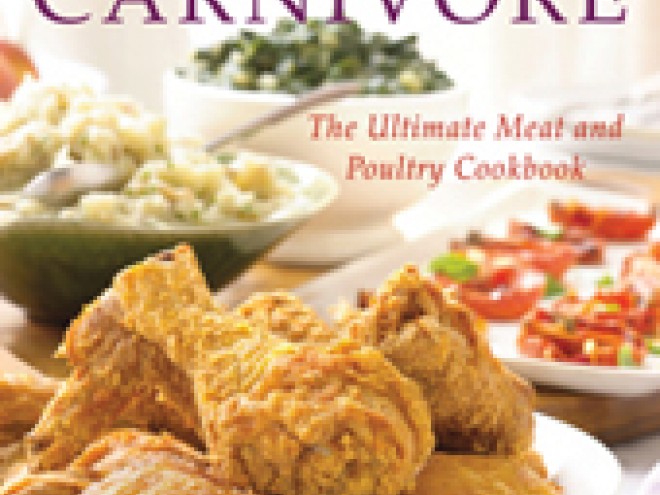June Hersh is the author of The Kosher Carnivore: The Ultimate Meat and Poultry Book, available this week. She will be blogging all week for the Jewish Book Council and MyJewishLearning‘s Visiting Scribe.
 If you had told me on my 55th birthday that in the coming year I would have a cookbook published and a second one in the works I would have told you to promptly return your crystal ball to Amazon and ask for a full refund. Prior to that year I had many roles, foremost mother and wife, and secondarily as a teacher at the Solomon Schechter Day School, founder of Fancy Schmancy, a children’s clothing company, and resource coordinator for my family’s lighting business. But cookbook author was not on my resume.
If you had told me on my 55th birthday that in the coming year I would have a cookbook published and a second one in the works I would have told you to promptly return your crystal ball to Amazon and ask for a full refund. Prior to that year I had many roles, foremost mother and wife, and secondarily as a teacher at the Solomon Schechter Day School, founder of Fancy Schmancy, a children’s clothing company, and resource coordinator for my family’s lighting business. But cookbook author was not on my resume.
After we sold our business, my sister stated what would become our mantra– we did well, now let’s do good. I took those as marching orders and proceeded to discover my newest incarnation, cookbook author. It seemed like a natural choice. I have always been a student of everything food, an adventurous eater and fearless cook. I find that there are not many endeavors that give you the instant gratification cooking does. Maybe it’s the Jewish mother in me, but the act of nurturing and nourishing is in my DNA. So many of my favorite memories are set around the kitchen table as a child, watching my mother lovingly prepare even the simplest dish. She could turn grilled cheese and tomato soup into a five star experience. So it seemed so natural that this would be the niche that I found to bring a new richness to my days.
My first project was Recipes Remembered: A Celebration of Survival, a book focused on the stories and recipes of Holocaust survivors. I would personally interview each and every survivor or their family member and write their remarkable story and recreate their cherished recipes. The good would be that I would donate all the proceeds to the Museum of Jewish Heritage, an institution that stands as a living memorial to the Holocaust. The experience was life-changing and resulted in a beautiful book that has raised both funds and awareness.
Once I was bit by the cookbook bug I didn’t want it to end. That incredible project was something that excited me every morning and kept me up at night. I dream in shades of medium rare, so it seemed to be an organic decision to write a book focused on meat and poultry. Happily, St. Martin’s Press agreed. The Kosher Carnivore was a revelation as it took my cooking to the next level. This time I wasn’t rebuilding other people’s recipes, I was creating my own. What could I do to meld succulent lamb shanks with pomegranates bursting with ripe seeds? How could I incorporate the summer’s sweetest peach into a gingery glaze for chicken? What new twist could I put on roast duck that would make the skin so crispy you could hear it crackle down the hall? My aim was to develop eclectic and innovative delicious food that happened to be kosher.
Shopping bags were replaced by grocery bags as I spent hours behind the counter of some of New York’s finest butchers. Donning an apron, I would carefully watch the butcher turn cuts of beef into works of art. I drooled over the fatty cap that rests atop the prime rib oozing with marbling. I marveled as the butcher ground brisket and chuck to create the juiciest hamburger blend. I questioned every stroke of the knife and every emphatic crash of the cleaver until I felt assured that I knew exactly how to expertly prepare the meat I was toting home. I returned from my visits with the same glow others get from an amazing facial.
I am now a veritable walking encyclopedia of bits of information about kosher cuts of meat. Invite me to a dinner party and I will regale you with cooking tips, wine suggestions and cookware advice. Want to hear how to best sear a duck breast or grill a juicy rib-eye? I’m your girl. And because I do love meat and potatoes, I can tell you how to turn Yukon golds into pareve mashed potatoes so creamy you want to take a nap in the bowl. My on-off switch is usually on, but a soft kick under the table or a gentle hand on my knee, tells me to change the conversation and save my riveting news about short ribs for another time.
Over the next few days I want to take you along on my culinary journey as I navigate the world of cookbook writing. I hope you enjoy the ride.
 Moroccan Lamb Shanks with Pomegranate Sauce
Moroccan Lamb Shanks with Pomegranate Sauce
Lamb shanks are rich, meaty, and succulent as the layer of fat that envelopes each shank bastes them while they cook. This Moroccan version features aromatic spices, which blend to give the shanks a punchy taste, while never overpowering their natural flavor. The addition of pomegranate juice brings a subtle sweet tart flavor to the sauce.
Behind the Counter The singular taste of lamb shanks really has no equal. Alternate cuts short ribs (+$) or osso buco (+$) or even turkey drumsticks cut osso buco style (-$)
About 4 servings
Start to Finish Under 3 hours
4 (12 – to- 16-ounce) lamb shanks
Kosher salt and freshly ground black pepper
2 tablespoons olive oil
1 large onion, sliced
6 cloves garlic, smashed
1 teaspoon ground cinnamon
1 teaspoon ground coriander
½ teaspoon ground ginger
1 teaspoon ground cumin
1 teaspoon kosher salt
2 dozen juniper berries
2 tablespoons tomato paste
1 cup sweet red wine
2 cups beef stock
1 cup pomegranate juice (derived from the seeds of 1 large or 2 medium pomegranates), or 1 cup bottled juice
Preheat the oven to 350 degrees. Season the shanks with kosher salt and pepper. Heat the olive oil in a braising pot and brown the shanks, over medium to high heat, on all sides, about 10 minutes. Be sure to stand the shanks on the edges to brown all sides. Remove the shanks and cook and stir the onion and garlic, over medium heat, until lightly softened, about 5 minutes. Add the spices, tomato paste, wine and stock. Stir over medium heat for 5 minutes. Add the shanks to the pot cover and roast at 350 degrees for 2 hours. Check the shanks every 30 minutes, turning them over in the sauce each time you check and admire them. While the lamb cooks, Process the pomegranate seeds if starting from scratch (see feedback), otherwise take a well deserved break.
When the lamb is nearly cooked, after 1½ hours, add the pomegranate juice. Continue cooking 30 minutes longer or until the meat on the shank is buttery soft and nearly falling off the bone. When finished, the sauce will be thick and concentrated (you can thin it with a little water or stock if needed). Spoon the sauce over the shanks and serve alongside rice, noodles or couscous.
Feedback
While pomegranates are loaded with antioxidants, their real power is to stain anything porous they come in contact with. If you are working with fresh pomegranates, I applaud your initiative. Late fall, October and November is the best time to buy fresh pomegranates, when they burst off the shelves with ripe seeds. Here are some tips for handling this persnickety fruit.
1. Wear something that can take a joke, you could end up looking like a victim from Law and Order, stained with red splatters
2. Cut, then squeeze the pomegranates over a bowl so you don’t lose any of the precious juice. There is additional juice in the tiny seeds. To juice those, fill a bowl with water, with your fingers gently loosen the seeds, over the bowl, and separate them from the papery membrane. The seeds will fall to the bottom of the bowl, while the thin fiber will float. Strain the water, reserving the seeds.
3. Pulverize most of the seeds in a blender (reserve a few for garnish). Strain the liquid pressing on the solids to extract all the juice. Discard the solids. Between the squeezed juice and the pureed seeds, you should have about ¾ – to- 1- cup of fresh juice from 1 large or 2 medium pomegranates.
Alternatively, you can buy pomegranate juice. It’s cleaner, easier but not nearly as much fun!
Check back all week for more posts and recipes from June Hersh.
June Hersh is a five-time published author, with four cookbooks and one Holocaust photography book. She focuses on food history, mainly the connection between Jewish experiences and food memory. June’s books are written with a charitable flavor, as her proceeds benefit not-for-profit Jewish-related organizations. She has been featured on radio, TV, in print, and hundreds of book talks related to her work.


